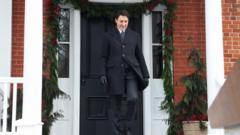After nearly a decade in office, Canadian Prime Minister Justin Trudeau announced his resignation, a decision influenced by increasing pressures from within his own party and ongoing public frustration with his leadership. On Monday, standing outside Rideau Cottage, Trudeau shared that his internal battles made it clear he could no longer be the best option for the upcoming elections, thus choosing to step aside as Liberal Party leader while remaining in his prime ministerial role until a successor is appointed.
Trudeau's political career took flight in 2015, presenting himself as a refreshing progressive choice for the electorate. He successfully transformed the Liberal Party from a third-place ranking to a majority in Parliament, a feat unprecedented in Canada. However, following two general elections and a series of scandals, including the SNC-Lavalin affair and ethical missteps, his government saw waning popularity, reflecting a broader disconnect with public sentiment.
As a seasoned leader at the age of 53, Trudeau remains the longest-serving G7 leader but faces criticism for being out of touch with an electorate experiencing rising costs and ongoing economic challenges. Paul Wells, a noted political journalist, articulated how Trudeau's legacy may reflect both "genuine leadership on issues" such as indigenous reconciliation and climate change, alongside a growing alienation from voters.
In his resignation speech, Trudeau pointed to his administration's triumphs in managing the COVID-19 pandemic and renegotiating trade agreements. Yet, his tenure has been punctuated by difficult moments, including two elections that damaged Liberal certainty in government stability, leading to diminished support from the electorate and exacerbating internal party strife.
Recent polls indicate a dramatic shift in public opinion with rising support for the opposition Conservative Party, led by Pierre Poilievre. A recent Angus Reid Institute survey highlighted that Liberal support has dwindled to its lowest since 2014, coinciding with a series of electoral losses for the party. Voter sentiment is echoed by internal party calls for leadership change, particularly following the abrupt resignation of key aide Chrystia Freeland, which many viewed as a significant blow to Trudeau's authority.
The call for a political reset has emerged as a cornerstone of Trudeau's rationale for stepping back, revealing an awareness of the need for fresh leadership to guide the country through its current challenges. The political landscape of Canada is poised for significant alteration as discussions of potential successors begin, with parties bracing for the forthcoming electoral battles amid the backdrop of international and domestic pressures.

















